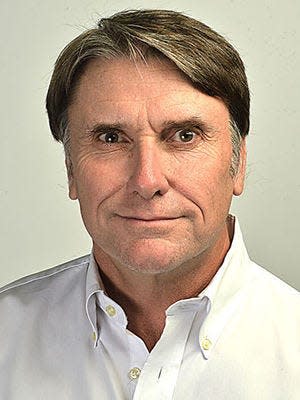World history is littered with tombstones of nations that relied on uninformed decisions
- Oops!Something went wrong.Please try again later.
- Oops!Something went wrong.Please try again later.
- Oops!Something went wrong.Please try again later.
- Oops!Something went wrong.Please try again later.
- Oops!Something went wrong.Please try again later.
Among our most cherished founding stories is George Washington’s response, “Father, I cannot tell a lie,” when asked if he had been the one who axed a prize cherry tree.
The irony is that this story itself is a lie, concocted by a propagandist in 1806. But that aside, honesty has been a fundamental pillar of our government, our culture, our religious and social institutions, our business and industry and our public and private relationships from the days of our first president right up to our 43rd.
That isn’t to say lies didn’t exist prior to 2016, of course they did. Political golden boy Jack Kennedy was helped into office by his lies about a “missile gap” between the Americans and Soviets that didn’t exist.

But Kennedy eventually backed off that claim, because lies were career killers. In most areas of life they still are, as Elizabeth Holmes found out, as did Trevor Milton, convicted last month of rolling a “hydrogen powered” tractor-trailer downhill to make it appear to investors that it was moving on its own.
Big Tobacco lied about cancer and paid a sizable financial price. Rafael Palmeiro lied about steroids and lost his reputation and a chance at the Hall of Fame.
Nixon lied, of course, a deception that paved the way for Jimmy Carter, elected in no small part by his promise never to lie (in retrospect, some of his re-election campaign managers probably wish he had).
Local news:Proposal could ban truck stop construction, require more review for large warehouses
Bill Clinton aptly demonstrated that the lies could get you into more trouble than what it was you were lying about. But he survived, and came out the stronger for it. Somewhere, Donald Trump was watching.
We call Trump’s claims of election fraud “the Big Lie,” but the big lie that touched off an avalanche of falsehoods was his repeated contention, years earlier, that President Obama had been born overseas. From there, the lies never stopped.
But even before Trump, the lies had become more political, the liars more unapologetic. We now know that Supreme Court Justice Sam Alito lied to then-Sen. Ted Kennedy about Roe v. Wade. We know that Bush-Cheney lied about weapons of mass destruction in Iraq. We know that Big Oil lied about climate change.
These lies were monstrously bigger than Nixon’s denials about his knowledge of Watergate, but by 2000, fewer politicians were paying a price for lying. It was, looking back, a transitional time. Everyone, even The New York Times, believed George W. Bush, because we just couldn’t imagine a president of the United States would ever engage in such an aggressive act of deceit.
Twenty years later, the script has flipped. We believe nothing our leaders say now, whether they’re telling the truth or not. Nor, apparently, does it matter.
The last politician to be taken down by lies might have been Michele Bachmann, who claimed that vaccines led to mental retardation. Even Rush Limbaugh was aghast, saying “Bachmann might have blown it. … There’s no evidence that the vaccine causes mental retardation.”
Evidence, schmedivence. We now know Bachmann was simply nine years ahead of her time.
Dracula Lives:After 125 years, Bram Stoker’s horror classic is still terrifying
Trump’s genius was in the sheer volume of lies, told with utter shamelessness. Like a bevy of quail, there was no way to shoot them all down.
But he also, oddly enough, benefited from our Internet-fed, knowledge-based society, in which everything could be looked up, and getting even the tiniest detail wrong was a full-fledged, finger-pointing, gotcha-fest. Instead of getting tired of Trump’s lies, we got tired of the people who were constantly calling them out.
As it seems now, we needed a little elasticity in the truth. If we were going to take issue with every little thing, then why bother to get it right? The system had become so rigid it could be shattered by one decisive hammer blow.
The question, for the future of America, is whether, once lost, we can ever regain the sanctity of the truth. Democracy depends on free, full and accurate information; when people willingly unharness themselves from the truth, the line between an informed and uninformed decision is inexorably crossed. And world history is littered with the tombstones of nations that relied on uninformed decisions.
There is some thought that the MAGA movement, most of it, understands Trump is lying, but considers it all part of a grand plan by the Messiah to set things right in the world. So if that basic understanding between right and wrong still exists, there is hope. MAGA, also, still has enough awareness to revert to the truth when under oath in court and facing potential perjury charges.
Still, a generation of children is growing up watching members of Congress, the Supreme Court and a president all lie without consequence. So how might a young George Washington have answered his father today?
Tim Rowland is a Herald-Mail columnist.
This article originally appeared on The Herald-Mail: A generation is watching government leaders lie without consequence
